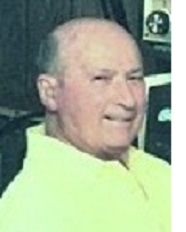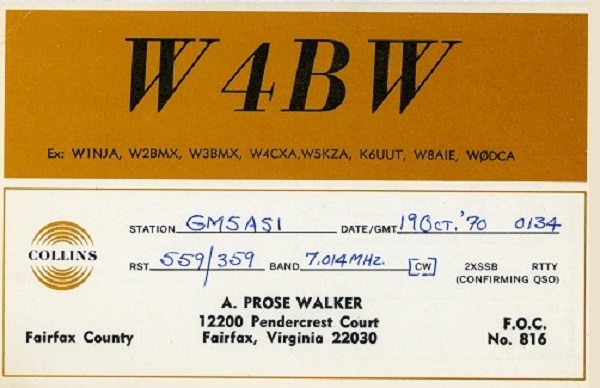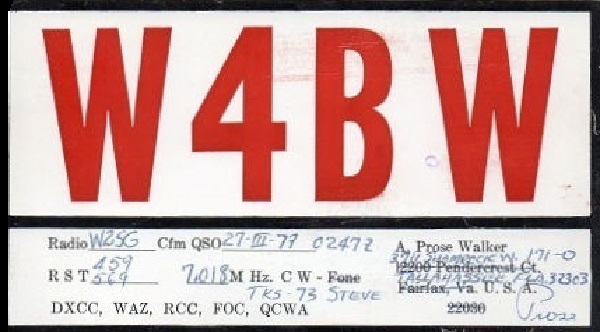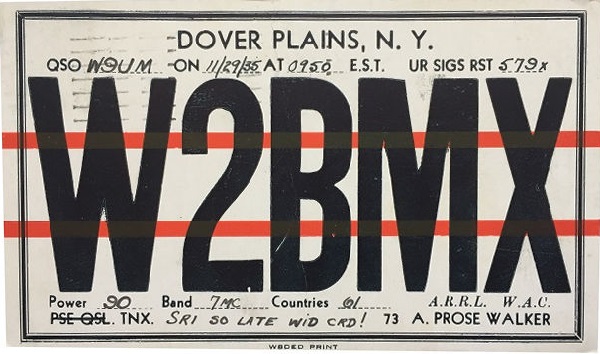 |
A. Prose Walker FCC Official Fairfax, VA McLean, VA Falls Church, VA Greece, NY Tallahassee, FL Washington, DC Rochester, NY Dover Plains, NY Newington, CT QCWA # 1243 |
W2NJA, W3BMX, W3LJM, W4CXA, W5KZA, K6UUT, W8AIE & WØDCA
NEWINGTON, CT, Sep 26, 2002--Former FCC official A. Prose Walker, W4BW, the man some consider the godfather of the so-called "WARC bands"--30, 17 and 12 meters--died August 8 following a brief illness. He was 92. Word of his death reached ARRL Headquarters this month.
 Walker, who headed the FCC Amateur and Citizens Division from 1971 until 1975, made the initial proposal for three new amateur allocations at 10, 18 and 24 MHz during an International Amateur Radio Club (4U1ITU) meeting in Geneva in 1972. Later, he organized and chaired the US preparatory committee for the Amateur Service--the Advisory Committee of Amateur Radio--which took the initial steps to turn the idea into reality at the 1979 World Administrative Radio Conference. The committee also included former ARRL General Manager Richard L. Baldwin, W1RU, who said this week that he was greatly saddened to learn of Walker's passing.
Walker, who headed the FCC Amateur and Citizens Division from 1971 until 1975, made the initial proposal for three new amateur allocations at 10, 18 and 24 MHz during an International Amateur Radio Club (4U1ITU) meeting in Geneva in 1972. Later, he organized and chaired the US preparatory committee for the Amateur Service--the Advisory Committee of Amateur Radio--which took the initial steps to turn the idea into reality at the 1979 World Administrative Radio Conference. The committee also included former ARRL General Manager Richard L. Baldwin, W1RU, who said this week that he was greatly saddened to learn of Walker's passing.
"One of my fondest memories of WARC 79 was the pleasure and the challenge of working with Prose in preparing for that conference," Baldwin said. "He was a stalwart supporter of the Amateur Service, and few amateurs realize how very much they owe to him. May he rest in peace."
Walker's most recent recognition came at Dayton Hamvention 2000, when he was recognized with a special achievement award, an honor his daughter, Helen Herman, said he coveted among many other more prestigious awards. The award recognized his work in obtaining the new amateur allocations at 10, 18 and 24 MHz more than two decades earlier.
An ARRL Life Member and a licensee since the 1920s, Walker was an enthusiastic amateur who remained quite active on the air until shortly before his death. Only a few months before he died, he bought a new ICOM IC-756PROII transceiver and reveled in becoming acquainted with its many features. Walker's favorite operating mode was CW, and he was a frequent visitor on the bands he'd helped to create.
Hospitalized or in rehabilitation facilities during all of July and part of August, he remained eager to get back home and on the air. "He wouldn't wait to get home and get on that ham radio," his daughter said.
A native of Ohio, Walker earned his bachelor's degree from Denison University. He later did graduate work at Ohio State. Over the years, Walker's career took a number of turns, including a stint as a high school science and mathematics teacher, but his primary contributions were in the fields of communications and engineering. During World War II, he served with the FCC Radio Intelligence Division, supervising the Radio Security Center in Hawaii.
Walker then went on to serve as chief of the Investigative Branch in the FCC's Radio Intelligence Division. Later, he headed the FCC's Allocations Branch and co-authored the CONELRAD emergency broadcast plan.
Walker left the FCC in 1953 to become director of engineering for the National Association of Broadcasters. He served with the NAB until 1961. During his tenure, he was editor-in-chief and author of portions of the NAB Engineering Handbook, published in 1960.
Collins Radio Company beckoned in 1961, where he headed up the Amateur Radio engineering development department and was involved in broadcast radio equipment development. He also befriended Collins founder and president Art Collins, W0CXX, and had a role in the development of FM stereo.

Broadcast consultant Paul Schafer, W6KWW, who called Walker his "very dear friend and mentor," described Walker as a legend in the broadcast industry for his accomplishments at the NAB and Collins Radio. "Prose had the ability to look forward," Schafer said. "He helped the industry and he certainly helped me. I'll miss him."
Before rejoining the FCC in 1971, Walker was a consulting engineer in Washington, DC. It was during his second tour of duty with the FCC that Walker headed up the FCC's Amateur and Citizens Division, which handled regulatory and licensing functions for more than a million FCC licensees. Phil Sager, WB4FDT--a former ARRL and FCC staffer--worked in the Amateur and Citizens Division in the mid-1970s. "Prose was always a gentleman and a fanatic ham from the old school," Sager said.
During his career, Walker earned a global reputation for participation and leadership within the International Telecommunication Union (ITU). He served both as a member and the chairman of many study groups and the plenary assembly of the International Radio Consultative Committee (CCIR), the ITU's technical arm. He was the leading member of the US delegation at more than 20 international conferences.
Walker was elected a fellow in the Institute of Electrical and Electronics Engineers (IEEE) in 1964 in recognition of his "contributions to international standards in the utilization of the radio spectrum." He also was a member of the A-1 Operator Club and a former member of the First-Class CW Operators' Club.
ARRL Chief Executive Officer David Sumner, K1ZZ, knew Walker and occasionally encountered him on the air. "The careers of some radio amateurs are so long and so rich that they bridge generations," Sumner said. "Prose was among these."
Sumner recalled his last "memorable" contact with Walker earlier this year on 80-meter CW. "We were reminiscing about various old-timers," Sumner said. "I mentioned that I lived just a couple of miles from where Ross Hull had accidentally electrocuted himself in 1938. Prose told me, 'I had dinner with Ross the night before.'"
Walker retired to Florida, but after his wife Ellanie died in 1999, he moved to Rochester, New York, to be near his daughter, Helen. A memorial service will be held later this year.
--some information provided by Helen Herman, with editorial assistance from Jim Boomer, W9UJ, and by Paul Schafer, W6KWW



W2BMX QSL provided by Pete, NL7XM